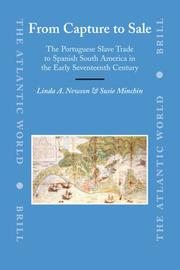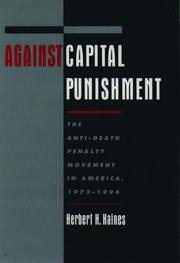| Listing 1 - 10 of 433 | << page >> |
Sort by
|
Book
ISBN: 0700631143 0700603948 Year: 1989 Publisher: University Press of Kansas
Abstract | Keywords | Export | Availability | Bookmark
 Loading...
Loading...Choose an application
- Reference Manager
- EndNote
- RefWorks (Direct export to RefWorks)
In this innovative study, Marietta Morrissey reframes the debate over slavery in the New World by focusing on the experiences of slave women. Rich in detail and rigorously comparative, her work illuminates the exploitation, achievements, and resilience of slave women in the British, Dutch, French, Spanish, and Danish colonies in the Caribbean from 1600 through the mid 1800s.Morrissey examines a wide spectrum of experience among Caribbean slave women, including their work at home, in the fields, and as domestics; their roles as wives and mothers; their health, sexuality, and fertility; and their decline in status with the advent of industrialization and the abolition of slavery.Life for these women, Morrissey shows, was much more hazardous, brutal, and fragmented than it was for their counterparts in the American South. These women were in a constant, dynamic struggle with men—both masters and fellow slaves—over the foundations of their social experience. This experience was defined both by their status as slaves and by gender inequality. On the one hand, their slave status gradually robbed them of their domain—the household economy—and created a kind of perverse equality in which slave women—like slave men—became “units of agricultural labor.” One the other hand, slave women were denied the access that slave men eventually gained to skilled agricultural work. The result of this gender inequality, as Morrissey convincingly demonstrates, was a further erosion of the status and authority of slave women within their own culture.Morrissey’s study, which addresses significant issues in women’s history and black history, will go far toward reshaping our perceptions of slave life in the new world.
Book
ISBN: 3110606100 3110608839 9783110608830 Year: 2019 Publisher: Berlin/München/Boston Walter de Gruyter GmbH
Abstract | Keywords | Export | Availability | Bookmark
 Loading...
Loading...Choose an application
- Reference Manager
- EndNote
- RefWorks (Direct export to RefWorks)
Die atlantischen Revolutionen am Ende des 18. Jahrhunderts zogen auch den Archipel der Kleinen Antillen in ihren Strudel. Die Umbrüche in Frankreich und Haiti sowie der global ausgetragene Krieg zwischen den europäischen Mächten eröffneten den verschiedenen Gruppen der karibischen Kolonialgesellschaft rasch neue Handlungsräume, die sie zu ihren eigenen Gunsten auszunutzen suchten. Dies hatte nicht nur bürgerkriegsähnliche Konflikte zur Folge, sondern unterminierte namentlich in den französischen Kolonien Martinique und Guadeloupe auch die Autorität der Behörden. Insbesondere die weißen Plantagenbesitzer setzen vor dem Hintergrund einer sich radikalisierenden Politik in Paris zusehends auf die britische Karte, so dass ihre Loyalität zur Regierung der Metropole immer mehr in Zweifel gezogen wurde. Flavio Eichmann untersucht diese Loyalitätskonflikte erstmals von Beginn der Französischen Revolution bis zum Ende der Napoleonischen Kriege und zeigt, dass sowohl Abschaffung als auch Wiedereinführung der Sklaverei im französischen Kolonialreich im Kontext dieses Konfliktfeldes verortet werden müssen. The study investigates the shifting loyalties on the part of colonial elites in the Lesser Antilles to the centers of empire during the crisis of revolution and counterrevolution and the global war between France and Great Britain. It argues that the abolition and re-introduction of slavery in the French colonial empire served to violently recalibrate the colonial political order.
Civil war --- Slavery --- Abolition. --- Empire. --- Sklaverei. --- Slavery. --- Terror. --- abolition. --- empire. --- terror. --- History. --- Antilles, Lesser --- History
Book

ISBN: 3111026523 3111026108 Year: 2023 Publisher: Berlin ; Boston : De Gruyter,
Abstract | Keywords | Export | Availability | Bookmark
 Loading...
Loading...Choose an application
- Reference Manager
- EndNote
- RefWorks (Direct export to RefWorks)
African slaves were brought into Brazil as early as 1530, with abolition in 1888. During those three centuries, Brazil received 4,000,000 Africans, over four times as many as any other American destination. Comparatively speaking, Brazil received 40% of the total number of Africans brought to the Americas, while the US received approximately 10%. Due to this huge influx of Africans, today Brazil’s African-descended population is larger than the population of most African countries. Therefore, it is no surprise that Slavery Studies are one of the most consolidated fields in Brazilian historiography. In the last decades, a number of discussions have flourished on issues such as slave agency, slavery and law, slavery and capitalism, slave families, demography of slavery, transatlantic slave trade, abolition etc. In addition to these more consolidated fields, current research has focused on illegal enslavement, global perspectives on slavery and the slave trade, slavery and gender, the engagement of different social groups in the abolitionist movement or Atlantic connections. Taking into consideration these new trends of Brazilian slavery studies, this volume of collected articles gives leading scholars the chance to present their research to a broader academic community. Thus, the interested reader get to know in more detail these current trends in Brazilian historiography on slavery.
SOCIAL SCIENCE / Slavery. --- history of Brazil. --- slavery: abolition.
Book
ISBN: 058521168X 9786610531936 1280531932 019802827X 1423763211 0195349180 1602567425 9781423763215 9781280531934 9780195349184 0197719716 Year: 2023 Publisher: New York : Oxford University Press,
Abstract | Keywords | Export | Availability | Bookmark
 Loading...
Loading...Choose an application
- Reference Manager
- EndNote
- RefWorks (Direct export to RefWorks)
Collecting work by several notable scholars, this book explains why the US still clings to capital punishment long after other democratic nations have abandoned it. It also exhibits a new way of thinking about state killing that goes beyond abstract moral argument and narrow policy debate to assess its impact on our legal system, its powerful symbolic appeal, and its place in today's ""culture wars.""
Capital punishment --- Abolition of capital punishment --- Death penalty --- Death sentence --- Criminal law --- Punishment --- Executions and executioners

ISBN: 1134315465 128004618X 0203314441 9780203314449 9781134315468 9781134315413 1134315414 9781134315451 1134315457 9780415333986 0415333989 9780415860116 0415860113 0415333989 Year: 2004 Publisher: London New York Routledge
Abstract | Keywords | Export | Availability | Bookmark
 Loading...
Loading...Choose an application
- Reference Manager
- EndNote
- RefWorks (Direct export to RefWorks)
Determinants of the Death Penalty seeks to explain the phenomenon of capital punishment - without recourse to value judgements - by identifying those characteristics common to countries that use the death penalty and those that mark countries which do not. This global study uses statistical analysis to relate the popularity of the death penalty to physical, cultural, social, economical, institutional, actor oriented and historical factors. Separate studies are conducted for democracies and non-democracies and within four regional contexts. The book also contains an in-depth investigat
Capital punishment --- Abolition of capital punishment --- Death penalty --- Death sentence --- Criminal law --- Punishment --- Executions and executioners
Book
ISBN: 1108515630 1108506690 1108514146 1108517129 1108524575 1108518613 1316658767 1107155487 1316609014 9781316658765 1108523080 9781108523080 9781108524575 9781316609019 9781107155480 Year: 2017 Publisher: Cambridge, United Kingdom New York, NY, USA
Abstract | Keywords | Export | Availability | Bookmark
 Loading...
Loading...Choose an application
- Reference Manager
- EndNote
- RefWorks (Direct export to RefWorks)
Final Judgments: The Death Penalty in American Law and Culture explores the significance and meaning of finality in capital cases. Questions addressed in this book include: how are concerns about finality reflected in the motivations and behavior of participants in the death penalty system? How does an awareness of finality shape the experience of the death penalty for those condemned to die as well as for capital punishment's public audience? What is the meaning of time in capital cases? What are the relative weights according to finality versus the need for error correction in legal and political debates? And, how does the meaning of finality differ in capital and non-capital (LWOP) cases? Each chapter examines the idea of finality as a legal, political, and cultural fact. Final Judgments deploys various theories and perspectives to explore the death penalty's finality.
Capital punishment --- Abolition of capital punishment --- Death penalty --- Death sentence --- Criminal law --- Punishment --- Executions and executioners

ISBN: 1281921165 9786611921163 9047419367 9004156798 Year: 2007 Publisher: Leiden ; Boston : Brill,
Abstract | Keywords | Export | Availability | Bookmark
 Loading...
Loading...Choose an application
- Reference Manager
- EndNote
- RefWorks (Direct export to RefWorks)
From Capture to Sale illuminates the experience of African slaves transported to Spanish America by the Portuguese in the early seventeenth century. It draws on exceptionally rich accounts of one of the most prominent slave traders, Manuel Bautista Pérez. These papers cover the whole journey of the slaves from Africa, through Colombia and Panama to their final sale in Peru. The prime focus of the study is on the diet, health and medical care of the slaves. It will not only be of interest to scholars of the slave trade, but also to those interested in the impact of the Columbian Exchange on diets, medicine and medical practice in the early modern period. The book is well illustrated and contains over thirty tables and seven appendices. From Capture to Sale has been selected by Choice as Outstanding Academic Title (2007).
Esclaves --- Slave trade --- Commerce --- Histoire --- History --- Portugal. --- Zuid-Amerika. --- Humanities --- Slavery & abolition of slavery
Book
ISBN: 0755698495 0857730886 1280512326 9786613595461 0857721062 9780857721068 9781848856943 1848856946 Year: 2011 Publisher: London : I.B. Tauris,
Abstract | Keywords | Export | Availability | Bookmark
 Loading...
Loading...Choose an application
- Reference Manager
- EndNote
- RefWorks (Direct export to RefWorks)
"By the time that Queen Victoria ascended the throne in 1837, the list of crimes liable to attract the death penalty had effectively been reduced to murder. Yet, despite this, the gallows remained a source of controversy in Victorian Britain and there was a growing unease in liberal quarters surrounding the question of capital punishment. Unease was expressed in various forms, including efforts at outright abolition. Focusing in part on the activities of the Society for the Abolition of Capital Punishment, James Gregory here examines abolitionist strategies, leaders and personnel. He locates the 'gallows question' in an imperial context and explores the ways in which debates about the gallows and abolition featured in literature, from poetry to 'novels of purpose' and popular romances of the underworld. He places the abolitionist movement within the wider Victorian worlds of philanthropy, religious orthodoxy and social morality in a study which will be essential reading for students and researchers of Victorian history."--Bloomsbury Publishing.
Capital punishment --- History --- Society for the Abolition of Capital Punishment --- History.
Book
ISBN: 1642593788 9781642593785 Year: 2022 Publisher: Chicago, Illinois : Haymarket Books,
Abstract | Keywords | Export | Availability | Bookmark
 Loading...
Loading...Choose an application
- Reference Manager
- EndNote
- RefWorks (Direct export to RefWorks)
Abolition. Feminism. Now. is a celebration of freedom work, a movement genealogy, a call to action, and a challenge to those who think of abolition and feminism as separate--even incompatible--political projects. In this remarkable collaborative work, leading scholar-activists Angela Y. Davis, Gina Dent, Erica R. Meiners, and Beth E. Richie surface the often unrecognized genealogies of queer, anti-capitalist, internationalist, grassroots, and women-of-color-led feminist movements, struggles, and organizations that have helped to define abolition and feminism in the twenty-first century. This pathbreaking book also features illustrations documenting the work of grassroots organizers embodying abolitionist feminist practice. Amplifying the analysis and the theories of change generated out of vibrant community based organizing, Abolition. Feminism. Now. highlights necessary historical linkages, key internationalist learnings, and everyday practices to imagine a future where we can all thrive.
Racial profiling in law enforcement. --- Imprisonment. --- Feminism. --- Prison abolition movements. --- Police corruption. --- Racism.

ISBN: 0195088387 0195132491 9786612384134 1280534885 9786610534883 0198024932 0195351061 1282384139 1602564000 9780198024934 9781602564008 9780195132496 9780195088380 0197743005 6610534888 9781280534881 9781282384132 6612384131 9780195351064 Year: 1996 Publisher: New York (N.Y.): Oxford university press
Abstract | Keywords | Export | Availability | Bookmark
 Loading...
Loading...Choose an application
- Reference Manager
- EndNote
- RefWorks (Direct export to RefWorks)
This is a full account of anti-death penalty activism in America during the years since the ten-year moratorium on executions ended in 1976. It traces the successful assault on capital punishment during the 1960s, and the struggle of abolitionists against the backlash since the mid-1970s.
Capital punishment --- -Abolition of capital punishment --- Death penalty --- Death sentence --- Criminal law --- Punishment --- Executions and executioners --- Moral and ethical aspects --- Abolition of capital punishment --- United States --- Capital punishment - United States
| Listing 1 - 10 of 433 | << page >> |
Sort by
|

 Search
Search Feedback
Feedback About UniCat
About UniCat  Help
Help News
News